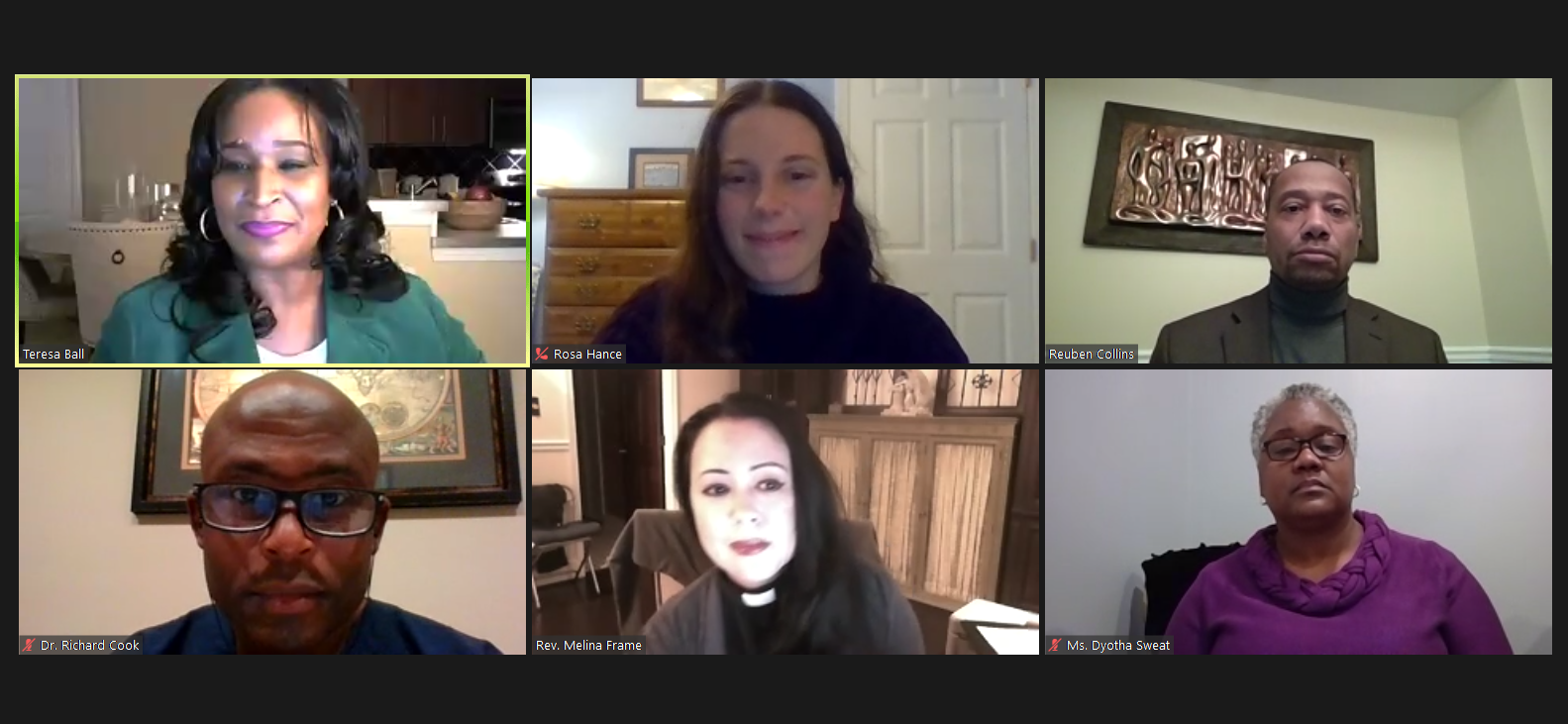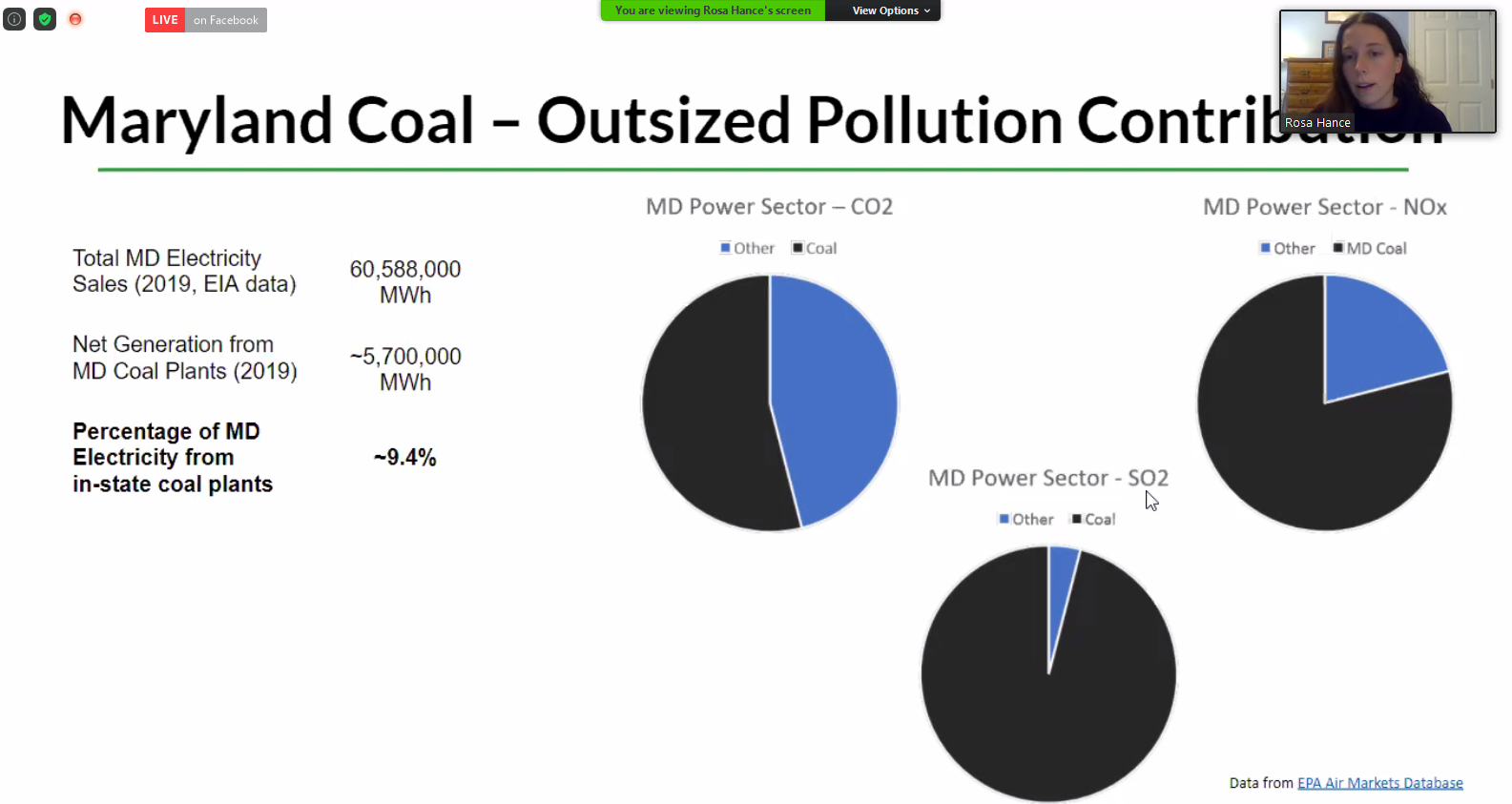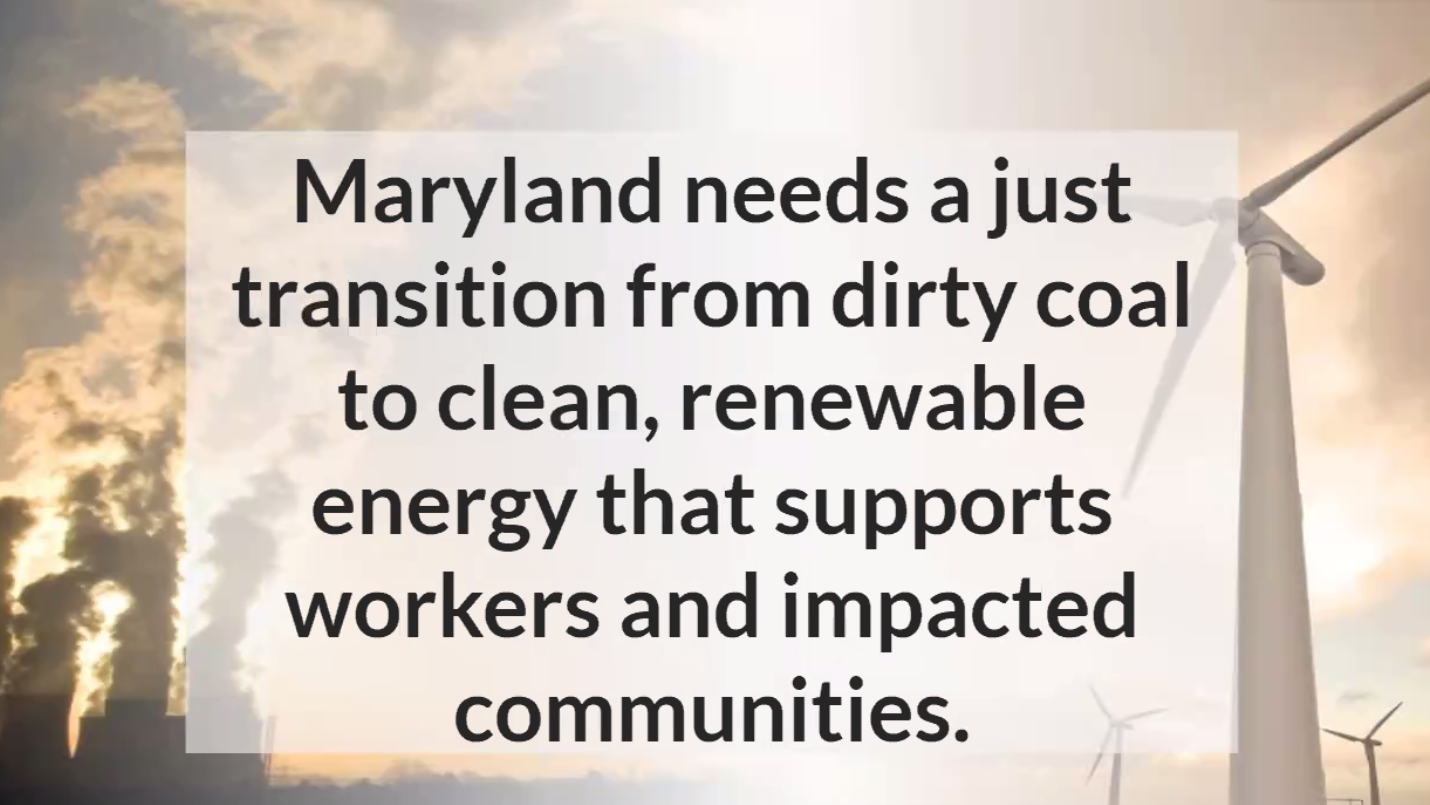
Event panelists: Moderator Teresa Ball with Ms. Rosa Hance, Commissioner Collins, Dr. Cook, Rev. Frame, and Ms. Dyotha Sweat
Wednesday night a powerful coalition of local leaders called for Maryland to develop a plan to stop burning coal and develop a transition plan for impacted workers and communities. The focus of the evening was the Morgantown Power Plant in Charles County, one of the largest and dirtiest coal-fired power plants in the state. Speakers explored the health, environmental, ethical, and economic impacts of coal and what it could look like to make a just-transition off coal to clean renewable energy.
Moderated by Teresa Ball of the Maryland Sierra Club Executive Committee, the panelists were: Reuben Collins, President of the Charles County Board of County Commissioners; Dr. Richard Cook, MD, President of the Charles County Medical Society; Rev. Melina Frame, Ecumenical Outreach Director, Apostolic Catholic Church of America; Rosa Hance, Chair of the Maryland Chapter of the Sierra Club, and Ms. Dyotha Sweat, President of the Charles County NAACP.
Against the backdrop of precipitous declines of coal power generation nationwide and in Maryland itself due to economic forces, panelists Maryland Sierra Club Chair Rosa Hance and Dr. Richard Cook stressed the outsized impact of coal power generation on air, water, land, and climate pollution. Specific environmental injustices attributed to Morgantown Coal were air quality issues, wastewater discharge pollution, and coal ash mishandling.

Slide shown during the event
Dr. Cook, Charles County Medical Society President and a practicing physician, reminded the over 100 viewers that pollution from coal plants resulted in negative health impacts including increased respiratory infections, wheezing, chest tightness, emphysema, and asthma, “all of which increase, ER visits and hospital admissions. … Children, African-Americans, and the elderly are more susceptible and more affected.“
He elaborated: “You’ve heard doctor's say your health is your wealth. You are what you eat. Well, you definitely are what you drink, what you breathe, and where you live; all impacts your health. So if you live in a polluted area, say Flint, Michigan, which we're all familiar with, and you drink lead-contaminated water, you will, in fact, get lead poisoning.”
The Maryland General Assembly will convene in January 2021. Ms. Hance said it was critical that individuals and groups press their legislators this upcoming legislative session for a clear, enforceable schedule to manage the transition away from coal to renewables. Such efforts, she said, “are necessary to make sure that the boom and bust of the fossil fuel industry does not impact vulnerable communities.” She suggested Maryland could learn from states like New York, Colorado, and New Mexico on just transitions from dirty coal to clean renewable energy that supports workers and impacted communities.

Slide shown during the event
Reverend Melina Frame observed that environmental justice “has only recently gone from being a scientific issue to a moral issue, and moral issues are what gets the attention of religious life.” Those with influence and wealth, she said, "have a talent for putting water treatment and coal plants in places they don't have to see. ... The good news is that the environmental justice movement has boomed in the faith world as a crucial issue. There are 22,000 congregations that have joined Interfaith Power & Light.” She then offered these insights about environmental justice:
"This is a value that the human mind has been designed to see. We've been designed to care about other people. And this includes people, of course, that are human secularists, that are agnostics, that are atheist. You know, this is not only an issue for religion. Now, the myth that science or religion are in conflict is now more than ever in need of being put to rest. Religion helps us borrow a moral framework for us to live in while science informs us. It is that very important ability for science to give us predictable models, for science to point us in the direction we need to work for, that makes these two camps so crucial to each other. While science informs, it is still in the human heart that propels us to action."
Ms. Dyotha Sweat, President of the Charles County NAACP, thanked Sierra Club for hosting the event, because as she said: “sometimes when we talk about environmental justice, most times, the NAACP is not actually in the space to actually lend advice on how you should move forward, or we can move forward as a community. Normally we're brought into the conversation when the plan is already planned, and then we're now responsible for executing it. So thank you for allowing us to be in on the ground, work for Charles County.” She referenced a survey done by NAACP documenting how black and Brown communities are affected at an alarming rate by polluting plants being placed in their communities.
“This is what the NAACP does is that we jumped in the fight and we make sure that the people that we're fighting for get justice. … We need to be able to have a plan in place that will help us navigate getting from the dirty to the clean. ...For those that are listening, please read up on what's going on in the Morgantown Plant, understand what's going on in your community and make sure that the people that we elect are doing what we need them to do. So we make sure that we have a safe and clean environment.”

Image of the Morgantown coal generating station shown during the event
The final panelist was an elected official, the esteemed President of the Charles County Board of County Commissioners Reuben Collins. During the last 10 minutes, he approached the issue of relying on coal power generation from an economic and policy perspective. He noted that in the past 10 years over half of the country’s coal plants have retired or are in the process of retiring. Recognizing the economic benefits the county has derived from agreements with the coal plant, he at the same time described the risks of not having a transition plan and the opportunities presented by clean, renewable energy.
“[Coal] pollutes our water, air, and climate with toxic waste streams and other harmful emissions. So it puts us in a very precarious position. The Morgantown power plant is the largest coal-fired power plant in Maryland without a plan to stop burning coal. Allowing Charles County to rely on coal without a transition plan comes with significant economic risks ... Without a plan, plants and mines can close without warning, leaving workers at the mercy of bankruptcy lawyers and out-of-state hedge funds. The best way to deal with the [coal] industry's rapid decline is by establishing a planned and managed coal transition that provides necessary resources for impacted workers and communities. This transition presents an opportunity to invest in new industries, including clean energy, which is rapidly growing its market share. Experts at the Maryland Department of the Environment have identified best practices for implementing a just transition … taking us away from using and being dependent on fossil fuels, including coal.
These practices include establishing a facility deactivation timeline and working with impacted workers and communities to plan for the transition on that timeline. A coal transition can help attract economic development that should be centered around improving the material conditions of these communities. Charles County is positioned well to invest in clean energy developments. It was also referenced earlier by Ms. Hance, that with this transition in Montgomery County, GenOn, the owner of the now retired Dickerson coal-fired power plant, has begun initial proposals to switch the Montgomery site to a large solar and energy storage facility.
That's the kind of energy investment that we would like to see in Charles County. We want to kind of be ahead of the game when we start looking at this. We don't want to be caught flat-footed. We want to take advantage of the potential opportunities that may come into play as a result of this transition. Working families in Charles County should no longer be made to bear the economic, environmental, and public health costs of living next to a toxic polluting coal plant.
Renewable energy, in addition to its low environmental impacts on air quality and low greenhouse gas emissions, is beneficial to our community’s economy. It is low cost, and costs continue to decline, which means energy prices can stay at affordable prices and be more accessible to our residents. … Renewable energy does not run out, which will allow future generations to still have energy sources, whereas other sources may one day be depleted.
These renewable energy potential opportunities exist with solar, wind, geothermal, low-impact hydroelectricity and more. Planning ahead for Charles County to attract additional economic development that can help offset the potential loss of tax revenue and gives the County time to advocate for additional support and resources from the state is paramount. In conclusion, I'd like to really emphasize that utilizing renewable energy is a win-win for our residents' pockets, the economy, and our natural resources. As you see, what we would like to try to emphasize is twofold. One, we understand the importance of this just transition, and we want to be prepared. We want to be at the table when these discussions are fully implemented. We want to be a part of solutions that will respond to the lost tax revenue. But at the same time, we want to create opportunities for our future economy that will enhance economic development opportunities across the board.
--Reuben Collins, President of the Charles County Board of County Commissioners
When thanked for his comments, Commissioner Collins said, “I'm not an expert, but this time has forced me to become better educated and it's forced, I think, a new way of thinking. I mean, we want to be in a position where this can be a plus for us, because we want to get outside of, you know, being totally committed to the dirty energy and the emissions that come out of coal plants. And we wanted to see it as an opportunity to move forward.”
The evening wrapped up with an invitation from the moderator Teresa Ball of Charles County to get in touch with Sierra Club for more information. She also made a final call to action:
"The time is now, right now, get involved in this conversation. Let your senators know, your congressional members know, your house of delegates members know, … if you have relationships on the federal side versus our state elected officials, let them know that this is an issue that's directly affecting us. The community, their constituency, the people that vote for them. Call your legislators, tell them that you want them to support the Coal Community Transition Act and that a bill will be coming this year."
Watch the full panel discussion here.